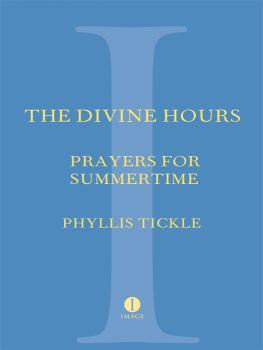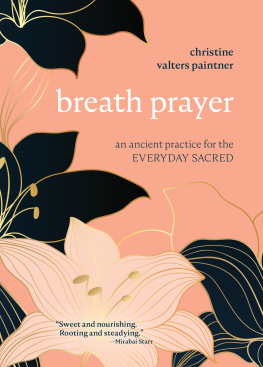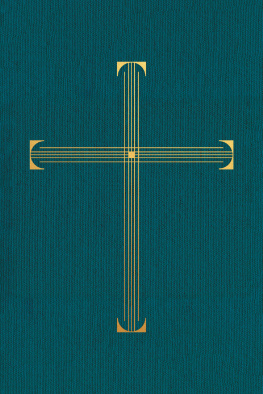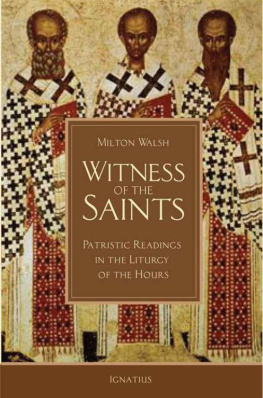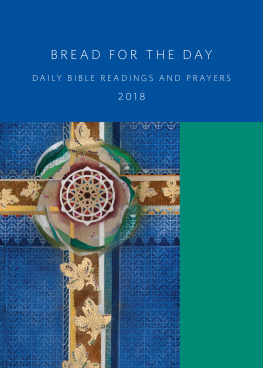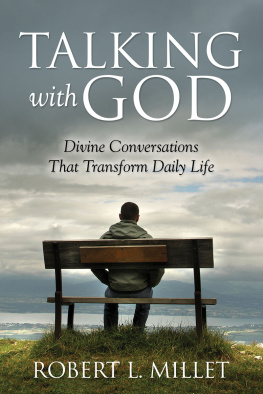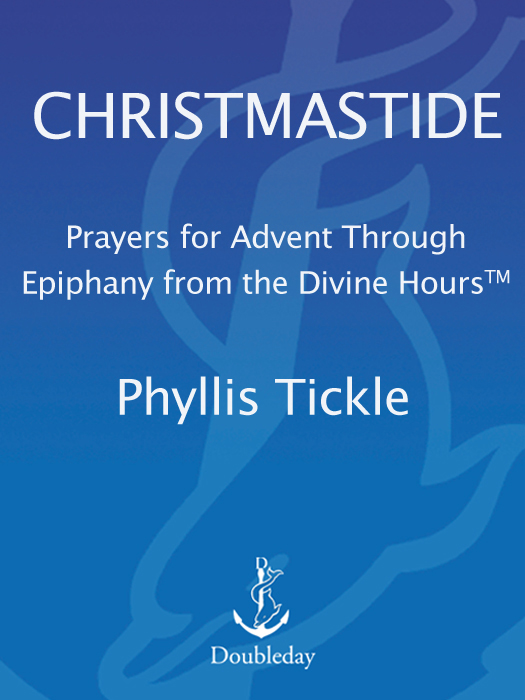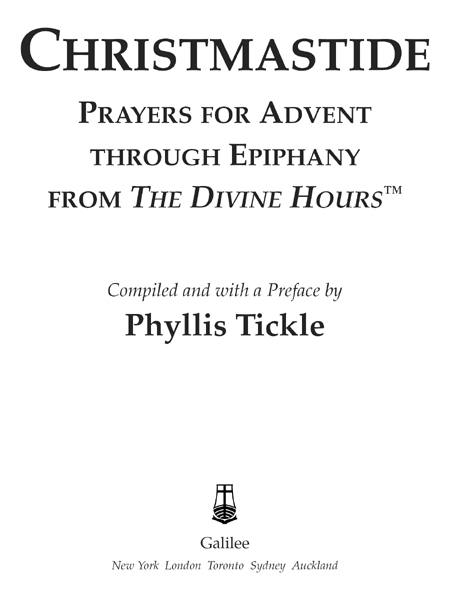A G ALILEE B OOK
PUBLISHED BY DOUBLEDAY
a division of Random House, Inc.
GALILEE and DOUBLEDAY are registered trademarks of Random House, Inc., and the portrayal of a ship with a cross above a book is a trademark of Random House, Inc.
First Galilee edition published November 2003
Excerpted material contained herein previously appeared in The Divine Hours: Prayers for Autumn and Wintertime, published by Doubleday in 2000.
The Library of Congress has cataloged the hardcover edition of The Divine Hours as follows: Divine hours: prayers for autumn and wintertime / compiled and with a preface by Phyllis Tickle.1st ed.
p. cm.
1. Prayers. 2. WinterPrayer-books and devotionsEnglish.
I. Tickle, Phyllis
BV 135. W 56 D 58 2000
264.15dc21 99-046160
eISBN: 978-0-307-55268-6
Copyright 2003 Tickle, Inc.
All Rights Reserved
v3.1_r2
Contents
T HE D AILY O FFICES
Whoever sings, prays twice.
ST. AUGUSTINE
An Introduction to This Manual
D espite its title, the book you are holding in your hands is not a book of prayers in the usual sense of that term. That is, while this is indeed a collection of prayers and while the ancient words it contains are intended for use during the four weeks of Advent and the twelve days of Christmas, it is neither a random collection of Psalms, hymns, scripture, and prayers, nor is it arranged for random or casual use. Rather, this is a manuala manual for doing fixed-hour prayer during the holy weeks of wintertime.
Sometimes called keeping the daily offices or observing the divine hours, fixed-hour prayer, together with the hallowing of the Sabbath and the celebration of Communion, is the oldest and most authentic form of Christian spiritual practice. Like Sabbath observance and participation in the communal Passover meal, it comes to us out of ancient Judaism and by way of the devout, practicing Jews who were first Jesus disciples and then, after the resurrection, His evangelists and missionaries. Through them and through the early regimens of the Church, all three practicesSabbath, Communion, and fixed-hour prayerwere passed to us and have remained with us as central, though adapted, parts of Christian discipline and Christian worship.
For me, and based on my own years of praying the hours, fixed-hour prayer is best understood as a kind of free, widely windowed, and open passageway between two placesone very physical and the other very virtual. Put more concretely, observing the divine hours allows our human awareness or mental focus to move back and forth on a daily basis and in a disciplined way from attending to the necessary bustle of each day of our lives to attending to the eternal timelessness and magnificence of divine life.
By the time of Our Lord, the hours for such praying had become fixed into a regimen almost identical to that followed by the Christian Communion today. The hours of six and nine in the morning, noon, three in the afternoon, sunset, retirement, and sometimes midnight were, as they still are, the ones when the faithfuleither alone or togetherstopped what they were doing, invoked the presence of God, praised him with the beloved hymns of two or three appointed Psalms, meditated on a piece of holy scripture, sang another hymn, and returned to the workaday world aware of the God to Whom they belonged and of the privilege of worship that had just been granted them.
While we do not have in the Gospels any record of Our Lords keeping fixed-hour prayer, we must assume that as a devout Jew, He did. We certainly know that the disciples did. Thus, the Spirit fell as tongues of fire upon them on Pentecost while, as we are told in Acts, they were gathered for prayer at the third hour of the daythat is, at nine oclock in the morning. Christianity spread beyond the confines of Judaism primarily because of a vision granted Peter early in the faiths history. That vision involved a sheet filled with unclean or forbidden, but edible, creatures and a heavenly voice instructing Peter to kill and eat. Three times Peter refused, saying that he had never broken halakah or Jewish dietary law in his life; and three times the voice answered by saying, What God has called holy, humankind must not call profane. Just as the sheet and voice withdrew for the third time, there came a knock at the door below. A Gentile, the servant of a Gentile, was there to beg Peter to come over into Macedonia and instruct them in this new way of salvation. It is a story we all remember. What we often forget to remember is that the knock of Corneliuss servant came from downstairs only because Peter was upstairs. That is, the story says, he had gone up to the rooftop at twelve oclock for what? For noonday prayers. In the same way, of course, the first healing miracle after Jesus Ascension occurred on the steps of the Temple as Peter and John, on their way to ninth hour (three oclock) prayers, passed and took pity upon a cripple begging there.
Because the words and hymns of the divine hours are ancient and because they are the hallowed verbal heritage of our faith, their use is not subject to much modification and/or license. Because they are words, however, and because the words appointed for each fixed hour vary not only from one another but also in accordance with the place of their observance in each day in the Churchs calendar (thus, Advents offices differ in content from one another and from those of Christmas), they require a degree of literacy. One must be able to read at some more or less fundamental level in order to follow the changing course of each fixed hour.
As Rome grew increasingly weaker, eventually falling into disrepair, and as the known world spun down into the Dark Ages, so too did literacy retreat from the citizenry of Europe, becoming instead the often rote possession of certain communities of monks. Thus, while the peasant faithful could observe the Sabbath withoutreading and could attend the Mass without being literate, they could no longer pray the divine hours. The observation of the offices passed, along with literacy, into the monasteries. Up until fairly recently, many American Christians, especially Protestant ones, thought of the daily offices almost entirely as something that monks did and that involved rote, albeit glorious, Gregorian chant. Even Protestants whose faith resonated with that of the praying couple in Jean-Franois Millets popular painting The Angelus failed to perceive any identity between themselves and the artists subject, between their own history and that vestigial and humble fragment of what had once been part of the office of sundown.
During the last decades of the twentieth century, however, that sense of alienation began to diminish, and lay Christians of every persuasion started to reclaim the divine hours as the third and missing piece in original Christian practice. This manual, like the larger ones from which it is abstracted, was born out of the urgency of that return. Using it requires no instruction beyond that printed on each page itself, save for three things.
First, many Christiansespecially Protestant ones who are accustomed to singing the fixed words of their worshipfind themselves more comfortable singing both the time-honored and fixed words of the Psalter and the beloved hymns of the vesper office. There is, in the midst of each line of the Psalms, a small asterisk that was originally set there as pointing in the Jewish psalter. On the last syllable before this asterisk, the singer will want to raise his or her monotonal pitch by a single note, just as the last syllable before the end of a line is lowered a note. Your ear will carry you from there to some of the nuisances that lie beyond this primary rule.


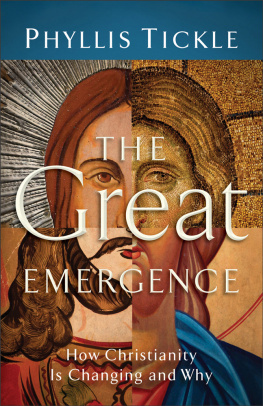
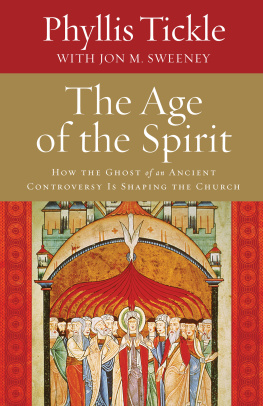

![The Standing Commission on Liturgy and Music - Daily Prayer for All Seasons [English Edition]](/uploads/posts/book/411072/thumbs/the-standing-commission-on-liturgy-and-music.jpg)
